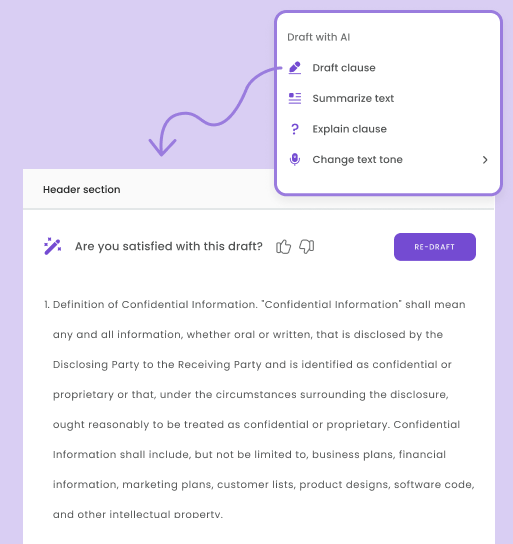There’s a piece of legislation known as HIPAA that impacts the healthcare industry and everyone who works with providers or practitioners.
Without going too deep into what HIPAA is, even vendors need to be compliant with some of the regulations. This is where the business associate agreement comes into play.
If you work or plan to work in the healthcare industry as a supplier, partner, or in some other capacity then it’s important.
In this guide, you’ll learn exactly what a business associate agreement (BAA) is, the key components of the agreement, compliance, and more.
What is a Business Associate Agreement (BAA)?
A Business Associate Agreement (BAA) is a legal contract between a covered entity and a business associate under the Health Insurance Portability and Accountability Act (HIPAA) in the United States. It outlines the terms and conditions regarding the handling and protection of protected health information (PHI).
In simpler terms, a BAA establishes the obligations and responsibilities of a business associate in safeguarding PHI when providing services to or on behalf of a covered entity.
It ensures that the business associate understands and agrees to comply with HIPAA regulations concerning the use, disclosure, and protection of PHI.
There are multiple terms that you should be familiar with when dealing with a BAA.
Covered Entity: In the context of HIPAA, a covered entity refers to healthcare providers, health plans, and healthcare clearinghouses that transmit any health information in electronic form. This includes doctors, hospitals, health insurance companies, and others who handle protected health information (PHI).
Business Associate: A business associate is an individual or entity that performs certain functions or activities on behalf of, or provides certain services to, a covered entity. Examples include third-party billing companies, IT contractors, and legal consultants.
Protected Health Information (PHI): PHI includes any individually identifiable health information transmitted or maintained by a covered entity or its business associate, in any form or medium (electronic, paper, or oral). This encompasses a wide range of data, including medical records, billing information, and insurance details.
HIPAA Regulations: HIPAA, the Health Insurance Portability and Accountability Act, is a federal law enacted in 1996 to protect sensitive patient health information from being disclosed without the patient’s consent or knowledge. HIPAA regulations set standards for the use and disclosure of PHI by covered entities and their business associates.
Purpose and Significance of the BAA in Healthcare:
The primary purposes and significance of a BAA in healthcare include:
Data Protection: BAAs help ensure that business associates safeguard PHI in compliance with HIPAA regulations, protecting patient privacy and confidentiality.
Risk Mitigation: By clearly defining the roles and responsibilities of covered entities and business associates, BAAs help mitigate the risk of PHI breaches or unauthorized disclosures.
Legal Compliance: BAAs are required by HIPAA for covered entities to engage in a business relationship with a business associate. Failure to have a BAA in place can result in significant penalties for both parties.
Accountability: BAAs establish accountability by outlining the consequences of non-compliance with HIPAA regulations, including potential liability for breaches or violations.
Legal requirements for BAAs under HIPAA
Under HIPAA regulations, there are specific legal requirements that BAAs must adhere to.
First, the BAA outlines the permitted uses and disclosures of PHI by the business associate, restrictions on the use or disclosure of PHI, and requirements for safeguarding PHI.
It also specifies the responsibilities of the covered entity and the business associate concerning PHI, including breach notification requirements and procedures for terminating the agreement.
BAAs should address how disputes related to HIPAA compliance will be resolved and the consequences for non-compliance, such as termination of the agreement.
BAAs must be updated as necessary to reflect changes in HIPAA regulations or the nature of the services provided by the business associate.
Parties Involved in a BAA
Covered entities and business associates are involved in a BAA, each playing a crucial role in ensuring the protection and security of protected health information (PHI).
Covered entities, as defined by HIPAA, encompass a broad spectrum of entities within the healthcare industry, including healthcare providers, health plans, and healthcare clearinghouses.
These entities handle PHI in various capacities and are directly subject to HIPAA regulations. Covered entities may range from individual healthcare practitioners and hospitals to health insurance companies and government healthcare programs.
They are responsible for implementing and maintaining policies and procedures that comply with HIPAA standards, safeguarding patient privacy and confidentiality.
In contrast, business associates are individuals or entities that provide services or perform functions on behalf of covered entities, involving the use, access, or disclosure of PHI.
Business associates may include third-party service providers, consultants, contractors, and vendors. These entities often have access to PHI while providing services such as billing, IT support, legal assistance, or data analysis to covered entities.
Business associates are required by HIPAA to enter into a BAA with covered entities, establishing the parameters for handling PHI and ensuring compliance with HIPAA regulations.
This contractual agreement outlines the specific obligations, responsibilities, and expectations of those involved concerning PHI protection, security measures, breach notification procedures, and HIPAA compliance.
The relationship between covered entities and business associates is founded on mutual trust, cooperation, and accountability in safeguarding PHI.
Effective communication and collaboration between these parties is essential to maintaining compliance with HIPAA regulations and upholding patient privacy rights.
Covered entities rely on business associates to support their operations while ensuring that PHI remains secure and confidential. Conversely, business associates depend on covered entities to provide clear guidance and expectations regarding PHI handling and compliance requirements.
Together, covered entities and business associates work in tandem to navigate the complexities of healthcare data management while prioritizing patient privacy and security in an increasingly digital healthcare environment.
Key Components of a BAA
Key components of a Business Associate Agreement (BAA) under HIPAA encompass various provisions aimed at safeguarding protected health information (PHI) and ensuring compliance with privacy and security standards.
Permitted uses and disclosures of PHI:
The BAA outlines the permissible ways in which the business associate may use or disclose PHI.
It delineates specific purposes for which PHI may be accessed, such as for providing services to the covered entity, and prohibits unauthorized uses or disclosures.
This section ensures that PHI is accessed and shared only as necessary for business operations and in compliance with HIPAA regulations.
Safeguards and security measures for protecting PHI:
The BAA mandates that the business associate implement appropriate safeguards and security measures to protect PHI from unauthorized access, use, or disclosure.
This includes administrative, physical, and technical safeguards tailored to the nature of the services provided and the sensitivity of the PHI involved.
The agreement may specify encryption protocols, access controls, employee training, and other measures to ensure the confidentiality and integrity of PHI.
Reporting requirements for breaches of PHI:
The BAA establishes procedures for reporting breaches of PHI to the covered entity promptly.
It outlines the business associate’s obligation to notify the covered entity of any security incidents or breaches affecting PHI, including the scope of the breach, potential risks to affected individuals, and steps taken to mitigate the breach.
This facilitates prompt action to address breaches and mitigate harm to individuals affected by the unauthorized disclosure of PHI.
Subcontractor agreements and their relationship to the BAA:
If the business associate engages subcontractors or third-party vendors to assist in performing services involving PHI, the BAA typically requires the business associate to enter into subcontractor agreements with such entities.
These agreements extend the requirements and obligations of the BAA to subcontractors, ensuring that PHI remains protected throughout the chain of service provision. The BAA may specify requirements for subcontractor selection, oversight, and compliance with HIPAA regulations.
Dispute resolution and termination clauses:
The BAA includes provisions for resolving disputes arising from non-compliance with the agreement or HIPAA regulations.
It may outline mechanisms for resolving disputes through negotiation, mediation, or arbitration. Additionally, the BAA delineates conditions under which the agreement may be terminated, including breaches of the agreement, failure to comply with HIPAA requirements, or other contractual violations.
Termination clauses specify the process for winding down services, returning or destroying PHI, and addressing ongoing obligations post-termination.
These key components of a BAA establish clear guidelines and expectations for the protection and handling of PHI, ensuring that covered entities and business associates collaborate effectively to safeguard patient privacy and comply with HIPAA regulations.
Understanding Compliance with the BAA
Understanding and complying with the terms of a Business Associate Agreement (BAA) is paramount in the healthcare industry due to its critical role in protecting patient privacy and ensuring compliance with HIPAA regulations.
The BAA establishes clear guidelines for PHI use, disclosure, security measures, breach notification procedures, and overall HIPAA compliance.
Failing to understand or adhere to the terms of the BAA can lead to serious repercussions, including breaches of patient confidentiality, financial penalties, damage to reputation, and legal liabilities.
Consequences of non-compliance with HIPAA regulations and BAAs:
Non-compliance with HIPAA regulations and BAAs can result in severe consequences for both covered entities and business associates.
Violations may lead to hefty fines imposed by the Department of Health and Human Services’ Office for Civil Rights (OCR), ranging from thousands to millions of dollars, depending on the severity and duration of the violation.
In addition to financial penalties, non-compliance can damage trust and reputation among patients, stakeholders, and regulatory agencies.
Moreover, breaches of PHI can result in significant harm to individuals, including identity theft, financial fraud, and emotional distress, leading to potential legal actions and lawsuits against the responsible parties.
Steps for ensuring compliance with the BAA:
To ensure compliance with the BAA and HIPAA regulations, covered entities and business associates should take proactive measures. This includes conducting thorough risk assessments to identify vulnerabilities and risks to PHI.
Implement appropriate administrative, physical, and technical safeguards to protect PHI from unauthorized access, use, or disclosure and provide ongoing employee training and education on HIPAA compliance and the terms of the BAA.
Additionally, conduct regular audits and assessments to monitor compliance and identify areas for improvement, and promptly address any breaches or incidents involving PHI by following established breach notification procedures outlined in the BAA.
Additionally, maintaining open communication and collaboration between covered entities and business associates is essential for addressing compliance issues and resolving disputes effectively.
By understanding and adhering to the terms of the BAA, healthcare entities can uphold patient privacy, mitigate risks, and demonstrate their commitment to maintaining the highest standards of compliance with HIPAA regulations.
Common Misconceptions about BAAs
Common misconceptions about Business Associate Agreements (BAAs) often stem from a lack of clarity or understanding regarding their purpose and requirements within the healthcare industry.
One prevalent misconception is that BAAs are optional or unnecessary for certain business relationships within healthcare.
However, under HIPAA regulations, BAAs are mandatory whenever a covered entity engages a business associate to handle protected health information (PHI).
Another misconception is that BAAs solely serve as legal formalities without significant practical implications.
In reality, BAAs play a crucial role in delineating responsibilities, establishing safeguards, and ensuring compliance with HIPAA standards, serving as vital tools for protecting patient privacy and confidentiality.
There is often confusion surrounding the scope of responsibilities and obligations outlined in BAAs. Some may mistakenly assume that only covered entities are accountable for HIPAA compliance, overlooking the shared responsibilities between covered entities and their business associates.
However, BAAs delineate the specific obligations of both parties concerning PHI protection, security measures, breach notification procedures, and overall compliance with HIPAA regulations.
Additionally, there may be misconceptions regarding the level of liability associated with breaches or violations of the BAA.
While covered entities retain ultimate responsibility for PHI protection, business associates are also subject to significant penalties for non-compliance, highlighting the importance of understanding and adhering to the terms of the BAA.
By addressing these common misconceptions and enhancing awareness of the role and significance of BAAs within the healthcare landscape, stakeholders can foster greater compliance, collaboration, and accountability in safeguarding patient information and upholding HIPAA standards. Clear communication, education, and adherence to BAA requirements are essential for mitigating risks, avoiding misunderstandings, and promoting a culture of privacy and security within healthcare organizations and their business relationships.
Conclusion
If you’re to handle PHI in any shape or form and are not a covered entity then a BAA is mandatory. It outlines your responsibilities and the nature of your relationship with a covered entity.
Keep in mind that, under HIPAA, you’re also responsible for protecting the data of patients. Before you sign a BAA, be sure to read it thoroughly, check all of the key components, and get a deep understanding of your obligations.
Let me know what you think in the comments and don’t forget to share.




